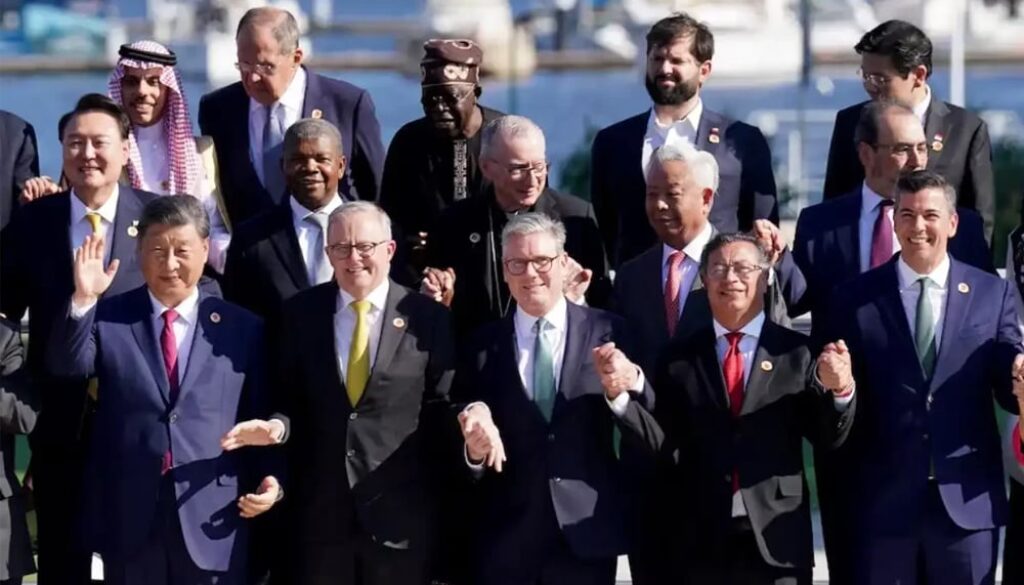G20 Leaders Demand Thorough Ceasefire in Gaza and Lebanon: Global Priority
The global world has stalled due to ongoing conflict in Gaza and Lebanon, making a demand for peace sound from the mouths of the G20. At their last summation in Rio de Janeiro, the world’s biggest economy leaders made an unprecedented declaration: demanding an immediate and full ceasefire in those areas. This blog digs deeper into these subtleties, with regard to the humanitarian implications and aspects on what’s in store ahead, in this extremely momentous decision based on the latest data and insights from international sources.
Understanding the Context of the Conflicts
Gaza: A Humanitarian Catastrophe
The Gaza strip, home to more than 2 million citizens has remained the focal point of a constant Israeli-Palestinian conflict. Escalations have caused unprecedented damage and displaced thousands, leaving them naked of basic resources. The region was made one of the most urgent humanitarian crises in the world due to blockades and endless military operations. Hospitals are congested and aid workers cannot handle the population’s needs.
Lebanon: A Shaky Country on the Brink
Violence in Lebanon has increased with spillover effects of the Gaza conflict. The nation already at an economic and political downturn, stands the risk of witnessing increasing violence on the southern borders. Hezbollah’s entry has complicated the issue further; there could be a larger conflict once fears of a regional strike reverberated.
Consolidated Position of G20: Central to International Diplomacy
Demand for Ceasefire:
The G20 declaration is also another international diplomatic landmark event. For the first time in history, leaders from different political spectrums have been able to voice their demand for the immediate stoppage of hostilities. It calls for adherence to UNSC resolutions and urges all parties to respect civilian protection and humanitarian access.
Two-State Solution Reinforced
One thrust of the G20 declaration is setting a threshold for peace in the form of a two-state solution. This goes in consonance with the world position that there is an underlying substance to ending the conflict when there exists such a possibility of a sovereign Palestinian state that coexists with Israel.
Humanitarian Assistance
Difficulty of Humanitarian Aid Delivery
In fact both Gaza and Lebanon have extreme difficulties in accessing humanitarian aid. Blockades and continued airstrikes have strained supply chains in Gaza, leaving millions in need of basic necessities such as food, water and medical care. Challenges in Lebanon further compounded delivery by adding logistical and security considerations.
Commitment of G20 Aid
The G20 leaders agreed to an informal humanitarian assistance procedure under international coordination. This declaration advocates for the safe and unobstructed delivery of aid as a way of reminding their people of the need for international cooperation, which can help in relieving suffering from affected peoples.
Wider Impact on Global Peace
Effects of Regional Conflicts Rippling Out
Gaza and Lebanon conflicts are not in isolation. They hold huge geopolitical implications, affect trading markets worldwide, security policies and move of refugees among others. This is why involvement of the G20 presents an integral scope of regional and global peace interdependence.
Test for Multilateralism
Another essential aspect of a ceasefire called by the G20 is the importance of multilateral diplomacy in solving complex conflicts. This collective action reminds the world community that stronger international mechanisms are needed to fix disputes and avoid increases in the intensity of these conflicts.
Challenges in Implementing the Ceasefire
Geopolitical Complexities
Achieving a ceasefire is a very easy talk to talk but difficult to do. The political dynamics in the region combined with the varying interests of key stakeholders like the U.S., Iran and Gulf nations places considerable barriers on implementing the G20 recommendations.
Trust Deficit Among Parties:
A challenge for both parties is mistrust. Ceasefires in the past have proved to be short-lived, not only because of failure to uphold agreements but also because of suspicion of each other. It is important for confidence to build openly through negotiation as the surest path to lasting peace.
Ensuring Accountability
The G20 really highlights the need for adhering to international law by portraying others accountable for violations thereof. That will be achieved only by a collective effort of the international community in punishing them should that be judicial action.
FAQs:
- How significant is the G20’s ceasefire appeal?
A united voice of G20 is very important as it reflects a global consensus over the urgency of halting violence and addressing humanitarian crises in Gaza and Lebanon.
- How does this fit into the two-state solution?
The two-state solution remains the bedrock of the G20 declaration on developing a framework for lasting peace ending the Israeli-Palestinian conflict.
- What stands in the way of delivering humanitarian aid?
The main obstacles revolve around logistics, continuing violence and constraints imposed by the conflicting parties.
- How can the international community support the effort of G20?
Global cooperation is in order. There is a need for monetary contribution to the aid programmes, diplomatic efforts to call for peace settlement and support the enforcing of international law.
- What are regional actors like the UAE and Saudi doing?
Regional actors like the UAE and Saudi have been very actively calling for peace and providing relief efforts, which also serves the purpose of the G20.
Conclusion: Call for Collective Action
Asking for a comprehensive ceasefire in Gaza and Lebanon does put the G20 on a very first step towards solving some of the burning conflicts of our times. But it would take ‘continued concentrated global effort, diplomatic finesse and humanitarian principles’ from across borders to convert this declaration into action.
It is a matter of choice for regional and international players to make good use of this peace opportunity. We can look forward to a more stable and peaceful Middle East if there is always dialogue, accountability and humanitarian work.The G20 declaration is more than a statement,it becomes a clarion call against the tide of violence for humanity to unite towards a brighter future.



